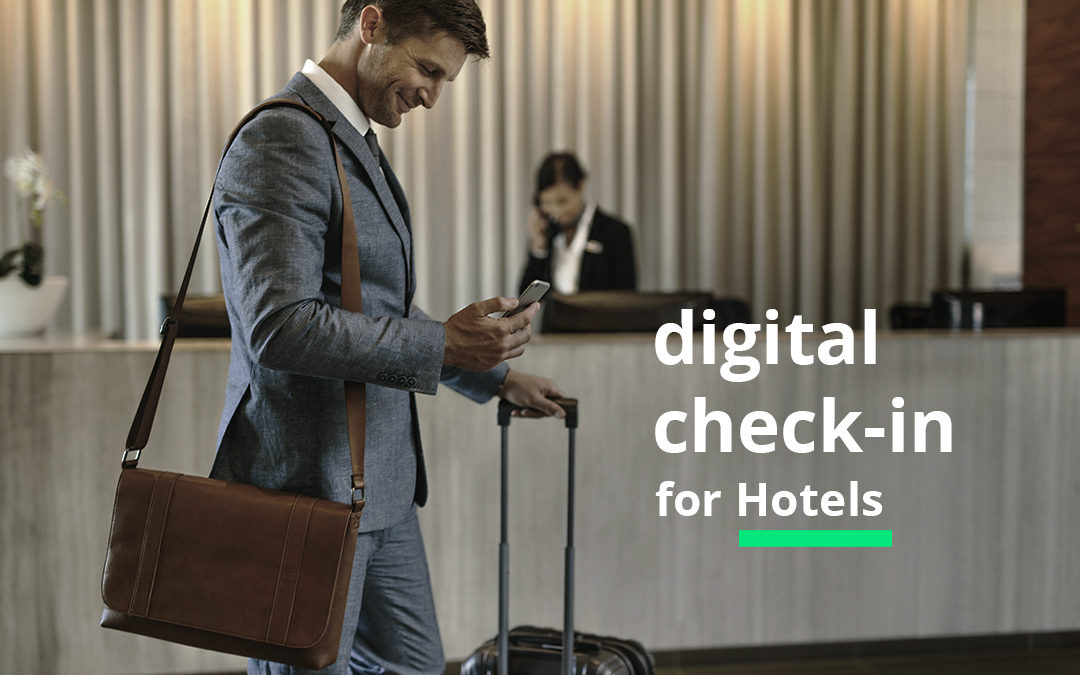What’s the first thing guests look forward to at a hotel? An answer you won’t hear is “waiting at the front desk to check-in”. With digital check-ins (or mobile check-ins) guests can skip the front desk formalities and long queues; instead, they’ll be welcomed in the lobby and immediately ushered to their room or given a tour of the property.
Digital check-ins enable guests to complete the ID and payment verification process online before they reach the hotel. Hospitality apps like Hudini can even convert guests’ mobile phones into their room keys, making the arrival process more guest-centric. Mobile check-ins also save the hotel staff’s time, enabling them to focus on improving the guests’ stay.
How do digital check-ins work
– On the eve of their arrival, guests will receive an app notification or email from the hotel with a link to the check-in form.
– Upon clicking the link, guests will be asked for their booking ID and payment details. – The information will be verified within seconds, and a wireless key reader will be issued to the guest immediately.
Guests can even customize their stay to the minutest detail by adding special instructions and preferences.
| Pro Tip: Keep the UX for digital check-ins simple and user-friendly. Hudini’s digital check-in, for example, is streamlined into the quick and easy 2-step process. |
Why is the hospitality industry switching to digital check-ins?
Digital check-in technology gained traction during the pandemic, when solutions that enabled social distancing became essential to the hospitality industry. More recently, it has evolved into the gateway feature of hospitality apps that connect all the touchpoints of the guest journey. Here are a few of the benefits that mobile check-in offers:
1) Quick and seamless arrivals: Guests can skip the queue at the front desk and walk right into their rooms, grab a quick meal at the restaurant or take a tour of the property. With digital check-ins, guests can make the most of their stay at the hotel.
2) Contactless services: Guests can complete the digital check-in process online, hence reducing the need for face-to-face interactions at the front-desk and crowding in the lobby. This also reassures guests that the hotel is following the latest safety protocols.
3) Service optimization: Automating the check-in process gives hotel staff more time to focus on having meaningful interactions with guests and offering suggestions that will enrich their stay.
4) Scope for personalization: Guests can specify their preferences and make special requests while completing their digital check-in. This data can be stored in the system and used to tailor experiences to the guests’ tastes during their current stay and future ones.
5) Opportunities to generate revenue: While a guest is checking-in online, natural extensions such as room upgrades and transportation to the hotel can be subtly introduced. These timely prompts have been reported to boost the hotel’s revenue by up to 12%.
6) Data accuracy: Since guests fill in personal and payment information themselves, the chance of data loss or inaccuracy is minimized.
| Pro Tip: Digitizing room keys and integrating the digital check-in process with the hotel’s PMS are crucial to the success of this technology. |
Digital check-ins can boost engagement between guests and hotel staff
It was once believed that digital check-ins will affect human interaction and therefore the overall hospitality experience. Smart hotels have implemented this hospitality technology and found that it’s not the case; in fact, a hybrid model works best. Some hotels have replaced the front desk with touchscreen kiosks and virtual assistants, allowing staff to focus on the one-to-one conversations that are so essential to hospitality.
Instead of being preoccupied with collecting guest information and thereby limited to a transactional interaction, the lobby staff can focus on truly welcoming guests and understanding their needs. Guests, on the other hand, can decide the level of assistance they require. What digital check-ins offer are greater control and convenience, not just to guests, but hotels as well
Seeing is believing
Know more about how you can reduce cost and
increase revenue by implementing an app less
360 degree guest experience solution
